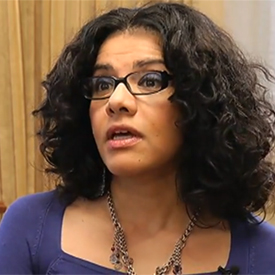Egypt assault highlights dangers journalists face
The horrifying story of journalist Mona Eltahawy – who alleges sexual assault by Cairo’s riot police during Egypt’s protests – is more common than people think, Channel 4 News hears.

Award-winning journalist Mona Eltahawy, who is now based in New York, alleges that she was filming on the front line at Tahrir Square on Wednesday when riot police beat her with sticks.
The former Reuters correspondent alleges on Twitter that she was brought from Tahrir Square to the interior ministry, where she was blindfolded for two hours and questioned, and passed between the central security forces (CSF) and the military police.
After her phone battery died, Ms Eltahawy was able to tweet once from a fellow activist’s phone while inside the interior ministry and was then silent, prompting her 78,000 followers to tweet using the hashtag, #freemona.
Once released on Thursday at around 11am GMT, Ms Eltahawy tweeted from her @monaeltahawy account about her treatment at Tahrir Square.
She wrote: “5 or 6 surrounded me, groped and prodded my breasts, grabbed my genital area and I lost count how many hands tried to get into my trousers.”
What did she expect would happen? The country is in a sensitive situation. We are under threat. Colonel Islam Jaffar, Egyptian military official
She posted photos showing a badly bruised and swollen hand, and later, a cast around her arm. But despite what she described as a “painful and surreal” ordeal, Ms Eltahawy said on Twitter that she “got off much easier than so many other Egyptians” because of being known as a media commentator and having dual citizenship.
‘What did she expect?’
A military official in Cairo called Colonel Islam Jaffar, who came into contact with Ms. Eltahawy while she was in detention, was quoted in the New York Times acknowledging her accusation.
“She complained to me that she was beaten and sexually assaulted by Central Security Forces,” Mr. Jaffar said.
“But what did she expect would happen? She was in the middle of the streets, in the midst of clashes, with no press card or form of ID. The press centre had not given her permission to be in the streets as a journalist. The country is in a sensitive situation. We are under threat. She could be a spy for all we know.”
Journalists at risk
Mohamed Abdel Dayem, Middle East and North Africa program coordinator for the Committee to Protect Journalists (CPG) told Channel 4 News the assault was not a one-off.
“The point is, this kind of thing happens to journalists, and female journalists, far more regularly that people think,” he said.
This kind of thing happens to journalists, and female journalists, far more regularly than people think. Mohamed Abdel Dayem, Committee to Protect Journalists
“It got out so quickly precisely because she has such a large following, and she bridges the foreign media and English media. She already has that exposure.”
An expert on Arab and Muslim issues, Ms Eltahawy is a columnist for Canada’s Toronto Star, Israel’s The Jerusalem Report and Denmark’s Politiken.
She has also published in The Washington Post and the International Herald Tribune and she has appeared as a guest analyst in several media outlets.
Egypt attacks
The CPG has documented evidence of 17 separate incidents of attacks against journalists last Sunday and Monday alone in Egypt, and more since then.
It has also called for the release of filmmaker Jehan Nujaim who was detained in Cairo on Wednesday.
“Filming is not a crime and authorities must release Nujaim immediately,” said Mr Dayem.
“The military and the police must stop using physical violence and detention to silence or intimidate journalists. Prosecutors have an obligation to look into these allegations.”
-
Latest news
-
Laughing Boy: New play tells the tragic tale of Connor Sparrowhawk5m

-
Sewage warning system allows some of worst test results to be left off rating system, analysis shows3m

-
Post Office inquiry: Former CEO didn’t like word “bugs” to refer to faulty IT system4m

-
Israeli soldier speaks out on war in Gaza12m

-
PM’s defence spending boost should be ‘celebrated’, says former Armed Forces Minister4m

-




